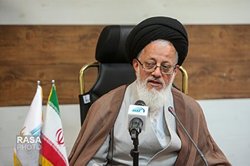 Ayatollah Hoseyni said that the United States is trying to create corruption in Iraq, and to place itself as the saviour of the Iraqi people, and to outwardly reform things in a way that it can still rule over Iraq. However, the United States was unaware that the ultimate destiny of the people was determined by God.
Ayatollah Hoseyni said that the United States is trying to create corruption in Iraq, and to place itself as the saviour of the Iraqi people, and to outwardly reform things in a way that it can still rule over Iraq. However, the United States was unaware that the ultimate destiny of the people was determined by God. RNA – During a visit to Rasa News Agency’s International Affairs Office, Ayatollah Sayyed Mojtaba Hoseyni, the representative of the Supreme Leader of the Islamic Revolution [Ayatollah Khamenei] in Iraq, discussed important issues related to the United States military and cultural presence in Iraq, the activities of the Islamic seminaries of Najaf and the presence of Iranian seminarians and foreigners in these Islamic seminaries.
Regarding the current situation in Iraq, the Iranian scholar said, “One of the current crises affecting Iraq is the political crisis. After its liberation from the yoke of the Ba’ath Party, this country was ensnared by the United States which occupied it and appointed dependent rulers and, in this manner, it took control of this country and deprived the Iraqi people of their destiny. The United States is blocking reforms, and is now trying to create divisions between the Iraqi and Iranian peoples and to take advantage of the situation while promoting religious bigotry.”
He emphasized that the Iraqi people have friendly and close relations with the Islamic Republic and noted, “In particular, 95% of the Islamic Resistance groups in this country support the positions of Iran and the Supreme Leader, and all members of these groups, both those who imitate him and those who imitate other sources of emulation, have a close relationship with the Supreme Leader and in short, the Iraqi people have more insight than in the past.”
Ayatollah Hoseyni said that the United States has waged sectarian wars since the beginning of the occupation of Iraq and added, “The issue of Daesh is one of the recent sectarian divisions that the United States has created among the Iraqi people in various regions to discourage Iraqis from stabilizing their country and resort to the United States. The United States is trying to create corruption in Iraq, and to place itself as the saviour of the Iraqi people, and to outwardly reform things in a way that it can still rule over Iraq. However, the United States was unaware that the ultimate destiny of the people was determined by God, and that was why the Iraqi people, both Shi’ahs and Sunnis, gradually realized the United States’ true colours and those who objected to my speeches criticizing the country, realized that not only did the United States not want to save them from the Ba’athists, but rather they were the basis of evil and instability in Iraq.”
His Eminence added, “The United States has focused all its efforts on dividing Iraq and creating dissension among the Iraqi people, and in addition to dividing Shi’ahs and Sunnis, it is also dividing Shi’ahs themselves and Iraqi fighters and promoting partisanship. On this basis, we see that many parties are competing in the Iraqi elections, and through the promotion of the federal system, they are trying to exclude the people and deprive them of the right to self-determination. Thus, according to the nature of partisanship, party prejudices replace the interests of the nation.”
In another part of his speech, he pointed to the activities of the Islamic seminaries of Najaf and the presence of Iranian and foreign seminarians in this seminary and noted, “After the overthrow of the Ba’athist regime, the seminaries of Najaf are witnessing the welcome of the flood of seminarians and clerics, and currently about 12,000 seminarians are studying and teaching in Najaf, some of whom are scholars from the seminaries of Qom.”
Ayatollah Hoseyni noted, “Currently, the seminaries of Najaf are operating in the traditional style of the seminaries of Iran and Iranian and foreign seminarians from different countries of the world study together, which has its advantages and disadvantages. Among the benefits of this is the fertilization of talents, and those who have a good ability for progress can grow and have a variety of learning skills. As a result, a student in the seminary of Najaf can experience an international atmosphere, and this is in contrast to the seminaries of Iran, where Iranian and foreign seminarians have little to do with each other. Among the disadvantages of this issue are the activities of enemy infiltrators among seminarians.”
Rasa News Agency
112/972